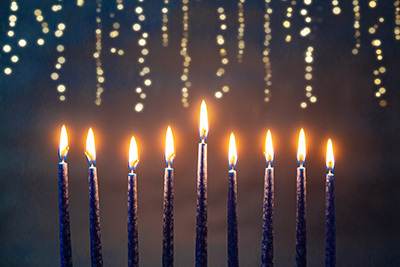Heroes and Dreamers of the Spirit of Light


Heroes and Dreamers of the Spirit of Light
I am writing to you on the last night of Chanukah. Tonight is nearly the darkest night of the month and year, as the Winter solstice arrives this Monday. The rabbis understood this 1500 years ago and intentionally had us light the nine lights of the menorah at this time on the calendar to pierce the darkness.
Let us be frank: we are living in dark times. I think of the staff who need to inform and be informed that they have Covid. I think of the resident who learns they are being transferred to a different room or campus or the hospital to ensure they get the maximum care they need, but are uprooted from the comfort of the familiar.

There are those confined to their rooms, which can feel so restrictive despite the knowledge it is a confinement of caution, love and protection. And there are others who bravely enter those rooms without hesitation to provide food and personal care. My heart goes to those who are being constantly briefed on updated policies so they can implement what will help us be safe. Residents miss loved ones, friends, table mates, families, affection and smiles without masks.
The anger and fear is palpable on our floors and in our buildings, as we arrive and when we depart. Some shed tears but can’t get the hugs they deserve, others wear a uniform of courage but go home and weep with loved ones or alone. For some, loneliness is the hardest part. For others, exhaustion is barely manageable. There are those among us who may have lost hope.
Moses knew our feelings. When his sister, Miriam, contracted leprosy, a highly contagious virus that often plagued members of the community, he prayed, "Oh G-d, please, heal her, please!" How many times have we prayed, "Source of life, keep them safe, keep me safe!"
I am so impressed and moved seeing residents take one day at a time with prayers and strength some did not know they had. I am touched and amazed by our extraordinary staff, who come through for residents and each other every day.
And the solution is coming soon! Very soon we will all be able to receive the vaccine. Tragically it will be too late for some, which makes the news bitter-sweet. But it is not too late for us. And it is never too late to ask ourselves, "What can I learn from what has happened this year?" To this I would recommend, do not waste a minute. Because soon this pandemic will be conquered and it will be natural for us to go back to worrying about matters which don’t really matter. So before redemption comes, let’s ask ourselves what is the lesson about life and ourselves for today? Whether you are 95, 50 or 20 there is an opportunity for growth today.
The prophet Zachariah said, "Not by might nor by power but by spirit…" We are not watching a gladiator fight where there will be a winner and a loser. This is not Star Wars with a war between good and evil. Rather, this is a pandemic which will be beaten not with sword but with love, not with weapon but with courage, not with anger but with the spirit of hope—and vaccines and medications, too.
You are the candle that illuminates the darkness. Thank goodness for you. May the Creator of the Universe bless you and everyone you love with health, hope, peace and the spirit of the light.

Rabbi Karen Bender
Skirball Director of Spiritual Life, Grancell Village Rabbi
[email protected]